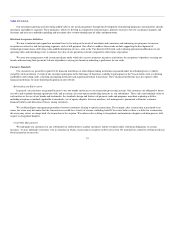Visa 2009 Annual Report Download - page 21
Download and view the complete annual report
Please find page 21 of the 2009 Visa annual report below. You can navigate through the pages in the report by either clicking on the pages listed below, or by using the keyword search tool below to find specific information within the annual report.
Table of Contents
• Regulation of Internet Transactions. Proposed legislation in various jurisdictions may make it less desirable or more costly to complete Internet
transactions using our cards by affecting the legality of those transactions, the law that governs them, their taxation and the allocation of
intellectual property rights.
• Safety and Soundness Regulation. Recent federal banking regulations may make some financial institutions less attracted to becoming an issuer
of our cards, because they may be subject to more conservative accounting procedures, increased risk management and higher capital
requirements.
Increased regulatory focus in connection with these matters may increase our costs, which could materially and adversely affect our financial
performance. Similarly, increased regulatory focus on our customers may cause a reduction in payments volume, which could materially and adversely affect
our revenues, operating results, prospects for future growth and overall business.
Regulation in the areas of consumer privacy and data use and security could decrease the number of payment cards issued, our payments volume
and our revenues.
Recently, there has been heightened legislative and regulatory focus in the United States (at the federal and state level) and elsewhere on privacy and
data use and security, including requiring consumer notification in the event of a data breach. These measures may materially increase our costs and our
customers' costs and may decrease the number of our cards that our customers issue, materially and adversely affecting our profitability. Our failure, or the
failure of our customers, to comply with the privacy and data use and security laws and regulations to which we are subject could result in fines, sanctions,
litigation, and damage to our global reputation and our brand.
Government actions may prevent us from competing effectively against providers of domestic payments services in certain countries, which could
adversely affect our ability to maintain or increase our revenues.
Governments in certain countries have acted, or could act, to provide resources or protection to selected national payment card and processing providers
in order to support them or to displace us from, prevent us from entering into, or substantially restrict us from participating in their countries. Our efforts to
effect change in these countries may not succeed. This could adversely affect our ability to maintain or increase our revenues and extend our global brand.
If government regulators determine that we are a systemically important payments system, we may have to change our settlement procedures or
other operations, which could make it more costly to operate our business and reduce our operational flexibility.
A number of international initiatives are underway to maintain financial stability by strengthening financial infrastructure. The Committee on Payment
and Settlement Systems of the central banks of the Group of Ten countries has developed a set of core principles for "systemically important payment
systems." Government regulators in the United States or elsewhere may determine that we are a "systemically important payments system" and impose
settlement risk management requirements on us, including new settlement procedures or other operational rules to address credit and operational risks or new
criteria for member participation and merchant access to our payments system. Any of these developments could make it more costly to operate our business.
20
























